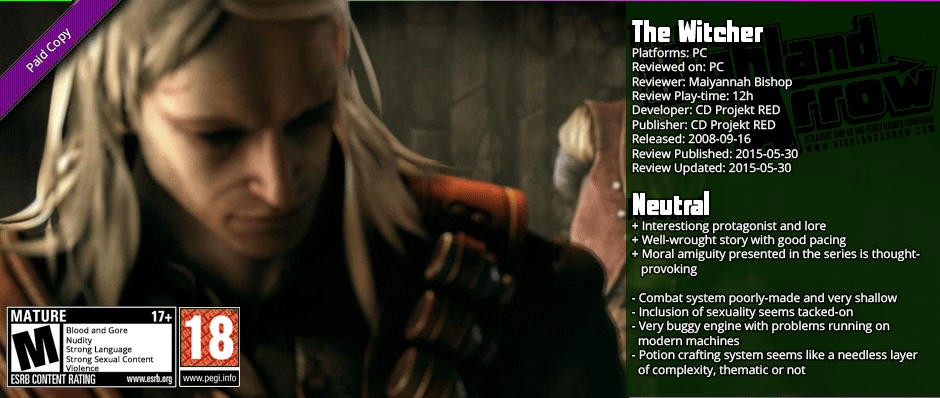

Editor's Note: Since GOG does not track play time outside of the newly-released Galaxy, the play time listed above includes only the replay for review, which was done using a Steam copy of the game.
The Witcher is a western-style computer role-playing game developed and published by CD Projekt Red. At the time, this game appeared without a lot of furor, which makes looking upon the franchise it has spawned since somewhat of a curiosity. Surely, one might think, if it has spawned such a following and such a series it must be some sort of saga for the ages. Well, it kind of is .. the story is well-written with some interesting moral ambiguity and good character writing. The problem is that as interesting a story as it wrought, the game itself was very rough at best, burdened with a lot of needless complexity in the name of being "deep."
The titular Witcher is a pretty interesting protagonist
The opening of the Witcher places you in the leather clogs of Geralt, known also as "The White Wolf" for his albinism, whom gets tasked to lift a curse from the daughter of a powerful noble. He manages to do so, but is gravely injured in the process, and retreats to a magical slumber to recover. He gets awakened by some beast or another, and the actual opening of the game sees you being saved and dragged home by fellow Witchers (or monster hunter) to help you recover, and sort out your plot-convenient case of amnesia from your slumber.
The keep is rapidly attacked by a motley crew of various bandits and mages with enough face piercings between them to stock a jewellery store, and so Geralt has to fight his way through the situation before being set off after an escaped mage whom purloins some important alchemical equipment central to their potion-making and consequentially their powers.
Witcher does one thing very well with the framing device of amnesia in this case, and its that it uses character interactions to develop both the ongoing story of Geralt and his backstory, and I don't just mean exposition dumps either, the perennial crutch of many a game. Rather, much of the back-story is related in how the various characters that Geralt encounters, and through his interactions with the environment as well. A lot of video game stories come off as two-dimensional because they forget such seeming simple precepts of story-writing, but to it's credit, Witcher not only does so, but does so well. One thing that stood to my mind was the surprise of a dwarf you have the option to save from a racist hazing whom recalls you, but that's but one among many similar seemingly-small interactions that add up to quite a good bit of polish onto the game's character development.
A perhaps important aside about the protagonist: As most prominently elaborated in this video (and the prior, referenced blog post) by RazörFist, the author of the original Witcher books Andrzej Sapkowski, which is the source material for the Witcher video game, stands accused of plagiarising the protagonist of the books. The appearance, background, and like are all at best inspired by Elric of Melniboné, a character originally written and developed by Michael Moorcock.
Michael Moorcock is said to have even pursued the matter legally, to have the Polish courts refuse to hear his claim, so the matter has never really been heard out in anything but the court of public opinion, but the similarities are definitely noteworthy enough to myself for me to include this note and its attached links so you can do some further looking yourself. I'm here ultimately to review the game, not the source material, but it would be remiss of me not to mention that.
That said, two things. Firstly, this is just an accusation, albeit one backed by some very curious similarities. Secondly, irrespectively of whether the source material is plagiarised, CD Projekt RED has done a great job of creating their own story and their own world that stand on it's own.
Sexuality in the Witcher is inoffensive,
but it also seems rather tacked on at best
As you might imagine, when the Witcher did release one of the more controversial aspects was the fact that it included a more than fair bit of sexual content to it. I was actually a little nonplussed at first when I played it, as a result of all that commotion about it, because of the juxtaposition of it, more than anything, I think. You get a minute of lead in, and then a blurred-out sex scene overlaid with a strangely-explicit post card.
"Collecting" those cards does lend the whole matter a sort of gamey and perhaps objectifying element that some will no doubt find fault in, but for my part I didn't feel it was egregious. It's not encouraged, and in fact some of the sex scenes come at the detriment of the player, mechanically speaking. Moreover, it fits with the sort of mildly "grimdark", somewhat dystopian setting of the Witcher, where disease is simply part of daily life, most of the people are out for themselves, and racism is rampant. It makes perfect sense in that context that characters in that world would seek escapist pleasures, and sex certainly is the most prevalent of those. As such, it didn't bother me, but at the same time, it didn't titillate me either. It was just there, and for the most part I gave it a pass.
That moral ambiguity is the Witcher's strength in the setting
A lot of high fantasy world falls into this somewhat immersion-breaking trend of being so high-strung idealistic in their worlds, their civilisations such utopias, that they can be difficult to relate to, but that is not the kind of world Witcher presents. Take for example, the theme of racism I mentioned a mere paragraph before. This isn't the kind of over-wrought racism such as we got in Dragon Age, where it almost would come across as comedic taken out of context. In the Witcher this is merely how it is - a fact of everyday life for non-humans such as dwarves and elves, and where Tolkien-esque fantasy sometimes portray elves and dwarves as righteous slighted parties in such matters, in the world of the Witcher, many of them are wankers to a precisely-equal degree. I found that much more interesting, and much more relatable, since real-world matters of sexism and racism are usually very grey affairs.
The combat in the Witcher is the most
complicated game of rock, paper, scissors you will ever play
On its face it's not all that complicated: you have fast enemies, tough enemies, and groups of weak enemies, and a combat stance that "works" for each and just doesn't at all for others, so ostensibly the combat is mostly getting that right, and clicking when prompted to get combos. It's not very engaging, and the complexity they add to it doesn't engage either. Basically they complicate it by having one weapon for killing people, one weapon for killing monsters, a variety of "oils" to apply for statistical benefits or to apply special afflictions to enemies. In this, the combat is .. basically un-fun busy-work, and as much as the Witcher might be a monster hunter, I could go without the "immersion factor" of making it a fairly boring hack and slash RPG. Since the game automatically positions you to deal with enemies and the skill tree is almost entirely passive buffs, there isn't even the Diablo III justification of needing some skill in how you used your abilities, and positioned yourself in the fray.
The irony of the skill tree being as heavily-reliant on passives as it is, and the weapon buffs likewise being passive, is it makes the actual combat itself very shallow and lacking in engagement, an intriguing contrast to the supposed mechanical depth of it. You can tweak numbers to min-max until the cows come, however, the fact remains that all you are doing is moving around, and clicking on enemies at a given time frame. Removing the endless clicking of Diablo might seem like a good idea in theory, but it comes at the cost of a fair bit of frustration, since it's expecting you to click within a certain window of time. While I'm all for punishing inattention of the player, this seems like a band-aid to make a poor and uninteresting combat system seem more skilful than it really is. Sure, clicking within a certain time window is more skilful than clicking your mouse with the frequency of an energetic dolphin with a motor-mouth, but not by all that much. I got bored very quickly with the Witcher's combat since positioning wasn't even all that crucial.
The potion-crafting isn't much better
I won't dwell on this for too long since the root complaint is essentially the same as the combat system: it's an insubstantial system to which the complexity is in the very fine numbers and that's it. You can craft potions from recipes and where you'd think you might at least have to know the recipes and perhaps do some gathering, in practice it basically means just loot whatever you can and be sure to brew a bunch of potions every time you rest. It's not as egregious as the combat system in that it's fairly unobtrusive, and it's thematic since the background of the Witchers includes them needing to imbibe these potions to stay alive and possess the powers they have, but ultimately, it feels like fluff, except on the harder difficulty level.
Aurora shows its age throughout the gameplay of the Witcher
While it was no doubt a good engine for its original time when traditional CRPGs were first making the transition to 3D graphics, going from Baldur's Gate to Neverwinter Nights, the Aurora Engine hasn't held up well. I've heard people praise the graphics as being good for the time, but I'd argue not. Models are fairly low-poly, textures have obvious seams, and it looks very low-res. It hardly kills the game, which benefits from a pretty decent if not exceptional art direction, but neither is it all that great. For comparison's purpose, Half-Life 2 came out a good many months prior, and looked much, much better, in my opinion. To CDPR's credit however, they did as much as I feel they probably could to make this engine look as good as it can, minus those obvious seams, with a bevy of graphical options unavailable at the time. It's still a product of it's time though, and the cutscenes vary between decent and utterly bad, with a bad case of blur (noticeable in the review lead-in graphic for example!), and it refused to work at all in multiple-monitor setups, necessitating me switching off the second monitor while I played. It was also fairly unstable, with the game seeming to crash if I went for a while without saving/reloading, suggesting some sort of memory leak or similar issue. I got the general impression of an engine pushed a little too far, that was straining to do all the Witcher asked of it.


